6 习语的翻译
习语翻译
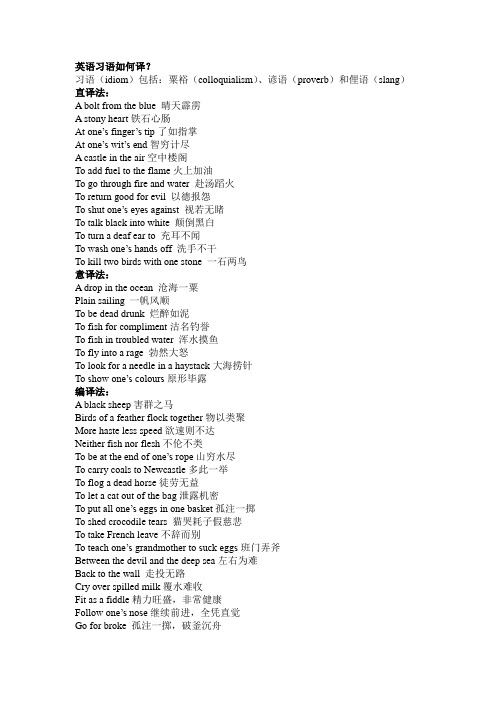
英语习语如何译?习语(idiom)包括:粟裕(colloquialism)、谚语(proverb)和俚语(slang)直译法:A bolt from the blue 晴天霹雳A stony heart铁石心肠At one’s finger’s tip了如指掌At one’s wit’s end智穷计尽A castle in the air空中楼阁To add fuel to the flame火上加油To go through fire and water 赴汤蹈火To return good for evil 以德报怨To shut one’s eyes against 视若无睹To talk black into white 颠倒黑白To turn a deaf ear to 充耳不闻To wash one’s hands off 洗手不干To kill two birds with one stone 一石两鸟意译法:A drop in the ocean 沧海一粟Plain sailing 一帆风顺To be dead drunk 烂醉如泥To fish for compliment沽名钓誉To fish in troubled water 浑水摸鱼To fly into a rage 勃然大怒To look for a needle in a haystack大海捞针To show one’s colours原形毕露编译法:A black sheep害群之马Birds of a feather flock together物以类聚More haste less speed欲速则不达Neither fish nor flesh不伦不类To b e at the end of one’s rope山穷水尽To carry coals to Newcastle多此一举To flog a dead horse徒劳无益To let a cat out of the bag泄露机密To put all one’s eggs in one basket孤注一掷To shed crocodile tears 猫哭耗子假慈悲To take French leave不辞而别To teach one’s grandmother to suck eggs班门弄斧Between the devil and the deep sea左右为难Back to the wall 走投无路Cry over spilled milk覆水难收Fit as a fiddle精力旺盛,非常健康Follow one’s nose继续前进,全凭直觉Go for broke 孤注一掷,破釜沉舟Happy as a clam无忧无虑Have ants in one’s pants心急如焚,坐立不安In the bag十拿九稳,成功在望Keep one’s fing ers crossed.心想事成Penny wise and pound foolish小事聪明,大事糊涂一劳永逸:get something done once and for all一日千里:advance at a high speed / fast improvement / at a tremendous pace 一望无际的沙漠:ocean of sand一无所有:have nothing at all一无是处:be good for nothing一窍不通:be utterly ignorant of一切就绪:All is in order/ Everything has been arranged.一面之词:one-sided statement一连串的问题:valley of questions眼明手快:quick of eye and deft of hand偃旗息鼓:stop all activities and lie low演员的阵容:array of actors掩盖矛盾:cover up the contradiction掩饰罪过:cover up sb’s crime平安度日:lead a life of peace平安无恙:safe and sound平淡无奇:unremarkable平分天下:divide the country身兼数职:hold several posts simultaneously机不可失时不再来:Don’t lose a golden opportunity/ now or never积怨甚深:have many complaints against鸡蛋碰石头:like an egg striking a rock鸡飞蛋打:All is lost积极参与:take an active part in doing sth积极态度:positive attitude积劳成疾:be broken down from constant work积习难改:be difficult to get rid of deep-rooted habits吉祥的象征:emblem of good fortune激起公愤:provoke public indignation急流勇退:retreat when sb feels unable to do sth通过不懈的努力:by steady effort统观全局:take an overall view of situation通报批评/表扬:circulate a notice of criticism/commendation挺身而出:step forward bravely饥寒交迫:suffer hunger and cold听觉敏锐:quick-eared/ have long ears通达人情:be understanding and considerate通俗易懂:easy to understand同床异梦:share the same bed but dream different dreams同病相怜:Misery loves company击毙歹徒:shoot dead the evildoer深厚的友谊:profound friendship身体素质:physical attribute身无分文:penniless身心疲劳:weary in body and mind深入研究:make a profound study身材魁梧:be tall and sturdy侥幸过关:pass luckily交游甚广:have a large circle of friends奖励制度:awarding system久经考验:have long tested久而久之:in the course of time / as time passes九泉之下:in the nether world费九牛二虎之力:spend tremendous efforts精神生活:culture life天下兴亡匹夫有责:Everyone is responsible for his country.夸大事实:outstep the facts / overstates the facts狂妄无知:be conceited and ignorant动机不纯:low motive条条框框:rules and regulations快刀斩乱麻:cut the Gordian knot头头是道:be clear and logical头条新闻:big news统筹安排:overall arrangement持久战:protracted war●心胸狭隘的人就像小口瓶子,里面装的东西越少,倒出时噪音越大●It is with narrow-souled people as with narrow-necked bottle; the less they have in them themore noise they make in pouring out.。
英语习语的翻译
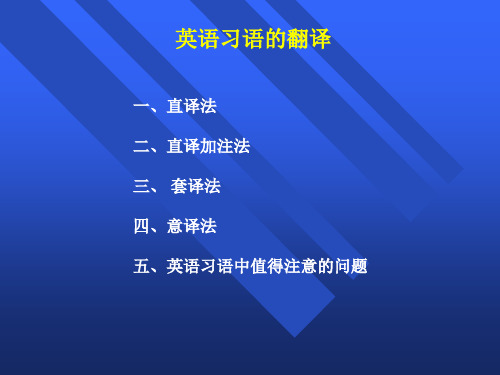
To wash one’s hand
“金盆洗手” 或 “洗手不干” 错! “推卸责任” 或 “断绝关系” 对!
五、英语习语中值得注意的问题
4. 准确理解英语习语, 弄清褒贬之分
It’s an ill wind that blows nobody good “天下无绝对的坏事” 或 “有弊也有利” 看似贬义, 其实是褒义. Birds of a feather flock together “物以类聚” “一丘之貉”
软硬兼施 赚钱养家 糊口 奉承,恭维
小菜一碟
精力充沛
be in apple-pie appleorder Butter would not melt in her mouth. One man’s meat is another man’s poison.
井井有条
装得清白无辜 一本正经
后悔已晚 与某人 有争论 插手, 干预
Hang on somebody’s sleeve To rain cats and dogs Hit the nail on the head A fly on the wheel
To miss the 依赖某人 boat 任某人做主
下倾盆 大雨
In a pig’s eyes
说得中肯, To the tune of 说得中肯, 一语道破 自高自大 的人
扫兴的人 或东西 采取回避 政策
A soldier of fortune
兵痞
Have a bee in one’s bonnet ( 头饰) 头饰) Hang on somebody’s lops To have other fish to fry
胡思乱想
To soil the beans To work hand in glove with
习语翻译

汉语习语的翻译
1.同义习语借用法
• 意义和形象相同或相似的习语
• 随大流
• swim with the tide
• 绞尽脑汁
• to rack one’s brains
• 千钧一发
• hung by a thread
• 浑水摸鱼
• to fish in troubled water
• 君子协定
• gentlemen’s agreement
• 黄鼠狼给鸡拜年 —— 不怀好意
• A weasel wishing Happy New Year to a chicken – harboring no good intentions.
• 老虎吃天 —— 无从下口
• A tiger wanting to eat the sky – not knowing where to start.
• 葫芦里卖的什么药
come.
• 塞翁失马,焉知非福?• What’s at the back of it?
• a blessing in disguise
• 意义相同但形象不同的习语
• 胆小如鼠
• as timid as a hare
• 臭味相投
• Like draws to like
• 缘木求鱼
We’re not talking about the castle in the air – the donkey’s carrot. No, I mean something we’ve all shared.
Those who like to make a scene will never get advantage.
习语翻译 拟声词翻译
汉语习语翻译英文

“知人知面不知心”•“You can know a man’s face but not his heart.”杨宪益•“Appearances certainly are deceptive!” Howks霍克斯•水中捞月•to catch the moon in the water /to make an impractical attempt•fish in the air;•cry for the moon;•plough the sands;• a wild goose chase•胸有成竹•直译:Before an artist can draw a bamboo, he must have the image in his mind •意译:to have a well-thought-out plan before doing sth.•意义相等的英语成语:to have a card up one’s sleeve剖腹藏珠Penny wise and pound foolish声东击西To shout in the east and strike in the west刻骨铭心To be engraved on one’s heart and bones眉飞色舞to beam with joy粗枝大叶To be crude and careless无孔不入To take advantage of every weakness竭泽而渔Kill the goose that lays the golden eggs打草惊蛇Wake a sleeping dog井底之蛙To be like a frog at the bottom of a well调虎离山To lure the tiger from the mountain口蜜腹剑To be honey-mouthed and dagger-hearted纸醉金迷(a life of) luxury and dissipation开门见山To come straight to the point单枪匹马To be single-handed in doing sth大张旗鼓On a large and spectacular scale海阔天空(to talk) at random易如反掌As easy as falling off a log玩火自焚Try in one’s own grease挥金如土To spend money like water掌上明珠The apple of one’s eye对牛弹琴Cast pearls before swine守口如瓶Keep a still tongue in one’s head雪中送炭Help a lame dog over a title画蛇添足Paint the lily小题大做Make a mountain out of a molehill赴汤蹈火Go through fire and water洗心革面Turn over a new leaf七上八下At sixes and sevens横行霸道Throw one’s weight about大发雷霆Blow one’s top过河拆桥Kick down the ladder•左右为难Between the devil and the deep sea•进退维谷Stick in the mud•骑虎难下Between the horns of a dilemma•左支右绌Between two fires•不上不下In a fix dilemma/ quandary/ predicament•无所适从Hold a wolf by the ears莫衷一是• 1. An Apple of Discord 争斗之源;祸根• 2. the Heel of Achilles / the Achilles' Heel唯一弱点;薄弱环节;要害• 3. Helen of Troy• 4.The Trojan Horse木马计;暗藏的危险;奸细• 5.Greek Gift(s) 阴谋害人的礼物;黄鼠狼拜年,不安好心• 6. Win/Gain Laurels获得荣誉;赢得声望•7. Under the Rose秘密地; 私下得; 暗中•8.Adam's Apple喉结孟母三迁moving one’s home for the desired environment for the education of one’s children •邯郸学步to imitate awkwardly•班女之才talented•百步穿杨extremely good at shooting•伯乐相马as capable as Bo Le in discovering talents•东施效颦imitate awkwardly•负荆请罪making an active apology•惊弓之鸟a deadly frightened person•劳燕分飞be separated•杞人忧天groundless worry•绕梁三日(of a song) so excellent as to let the audience feel it lingering for a long time •塞翁失马a loss may turn out to be a blessing•相濡以沫to help each other in the time of need;•(of an aging couple or a couple in general) to help each other in their remaining life or life in general•一饭千金to cherish others’ kindness at heart and repay it•初生牛犊不怕虎•New-born calves make little of tigers•Young people are fearless•明枪易躲,暗箭难防It is easy to dodge a spear in the open, but hard to guard against an arrow shot from hiding.•城门失火,殃及池鱼A fire on the city wall brings disaster to the fish in the moat.•路遥知马力,日久见人心。
习语的翻译

Advice and correction roll off him like water off a duck's back.
劝导和惩罚对他好像水过鸭背似的根本 不起作用。
3.释义
在直译和加注无法翻译原文习语时课考虑采用释义法,牺牲原文 比喻形象,只保留其意义。
She found herself to be a fifth wheel in the family. 她感到自己成了这个家里多余的人。
3. 杂而不精的人。 4.及时缝一针,可以省九针;小洞不补,大洞吃苦。 5.不辞而别 6.半斤八两 7.谨言慎行 8.海底捞针
9.他刚迷糊了一会儿。
10.他的妻子掌握经济大权。
11.你别多管闲事。
12.难道你不知道灾难即将来临吗?
13.那天晚上他睡得很香,醒来时膝盖几 乎恢复了原状。
鉴于公司间的恶意接收出价最近猛增,这个国家里的那些最大的 公司有15%已为高级管理人员配备了“黄金降落伞”(*黄金降落 伞:一种工作合同,规定所在公司如被收购,雇员[常为高级行政 管理人员]可以辞职,而其薪水和各种福利照旧,直至合同期满。)
Pampering is building into what is called the "four-two-one syndrome"*-four grandparents and two parents, all doting on an only child.
青少年们不邀请鲍勃参加他们的聚会因 为他是一个令人扫兴的人。
4.归化
归化译法也叫套译法。由于文化的差异,英语习语中的形象不符合汉语 习惯时,直译出的意义就不宜被理解和接受,意译则又失去了习语生动 形象的特点,这时课采用归化译法。恰到好处的归化可使译文地道简洁、 生动活泼,便于移入语读者理解和接受。
汉译英 习语翻译
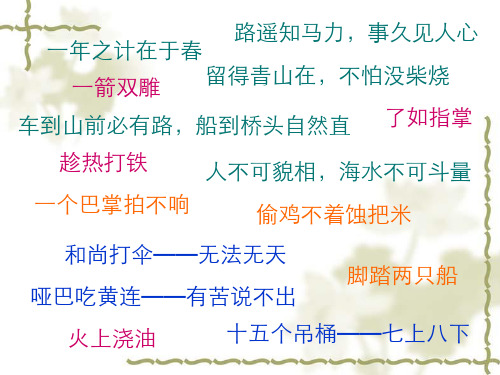
Features of Idioms
5、习语常利用声音的和谐来达到易懂易记、顺口入耳、生动有力的目的。 习语常利用声音的和谐来达到易懂易记、顺口入耳、生动有力的目的。 利用韵脚:狗咬吕洞宾,不识好人心;一招鲜,吃遍天;良药苦口利于病,忠言逆 利用韵脚 耳利于行; A friend in need is a friend indeed. East or west, home is best. Man proposes, God disposes. Health is better than wealth. Beggars should not be choosers. fair and square; high and dry; wear and tear. 利用双声: 利用双声:八面玲珑,聪明伶俐,慷慨激昂,明媚灿烂 Alliteration: as blind as a bat, as busy as a bee, as clear as crystal, as dead as a doornail, as cool as a cucumber, as red as a rose, as proud as a peacock, at sixes and sevens, spick and span, then and there through thick and thin tit for tat neither fish, flesh or fowl Care killed the cat. Money makes the mare to go. Many men, many minds. Speech is silver (silvern), silence is golden.
一年之计在于春 一箭双雕 趁热打铁 一个巴掌拍不响
(完整版)Ⅷ.习语、谚语、俗语、诗句的翻译.
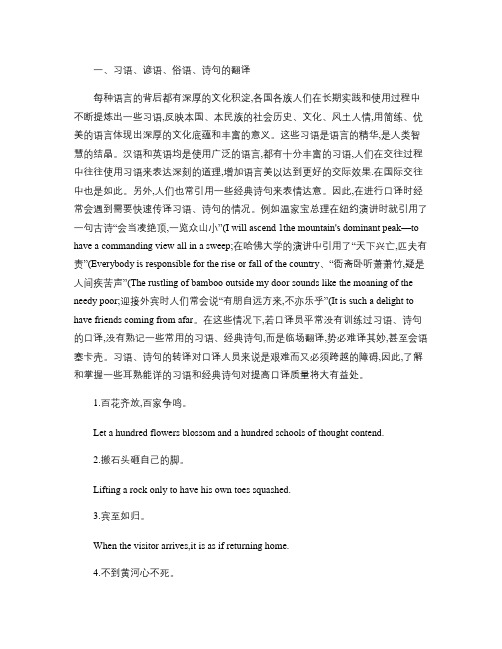
一、习语、谚语、俗语、诗句的翻译每种语言的背后都有深厚的文化积淀,各国各族人们在长期实践和使用过程中不断提炼出一些习语,反映本国、本民族的社会历史、文化、风土人情,用简练、优美的语言体现出深厚的文化底蕴和丰富的意义。
这些习语是语言的精华,是人类智慧的结晶。
汉语和英语均是使用广泛的语言,都有十分丰富的习语,人们在交往过程中往往使用习语来表达深刻的道理,增加语言美以达到更好的交际效果.在国际交往中也是如此。
另外,人们也常引用一些经典诗句来表情达意。
因此,在进行口译时经常会遇到需要快速传译习语、诗句的情况。
例如温家宝总理在纽约演讲时就引用了一句古诗“会当凌绝顶,一览众山小”(I will ascend 1the mountain's dominant peak—to have a commanding view all in a sweep;在哈佛大学的演讲中引用了“天下兴亡,匹夫有责”(Everybody is responsible for the rise or fall of the country、“衙斋卧听萧萧竹,疑是人间疾苦声”(The rustling of bamboo outside my d oor sounds like the moaning of the needy poor;迎接外宾时人们常会说“有朋自远方来,不亦乐乎”(It is such a delight to have friends coming from afar。
在这些情况下,若口译员平常没有训练过习语、诗句的口译,没有熟记一些常用的习语、经典诗句,而是临场翻译,势必难译其妙,甚至会语塞卡壳。
习语、诗句的转译对口译人员来说是艰难而又必须跨越的障碍,因此,了解和掌握一些耳熟能详的习语和经典诗句对提高口译质量将大有益处。
1.百花齐放,百家争鸣。
Let a hundred flowers blossom and a hundred schools of thought contend.2.搬石头砸自己的脚。
习语翻译

墙头草, 两边倒
sit on the fence
• 你怎么能够相信他呢?他是个墙头 草,谁硬就跟谁。 • How can you trust him? Don’t you know that he always sits on the fence and falls on the side of the stronger?
a stick-in-the-mud
• 你可以说我丈夫是个老古董,但是 我倒很喜欢他的这种性格。 • You may regard my husband as a stick-in-the-mud, but on my part I like his personality of that kind.
•
• •
• • •
指望;依 靠 Tom: Don’t you worry about the election? I think Joe will be on our side and so are his friends. Sue: But how can we bank on him? He’s always straddling the fence and falling on the side of those who are stronger. Tom: But we have been on good terms all these years. Sue: All these years? He has also been on good terms with other guys. Tom: But I’m convinced that he’ll be on our side this time. Sue: No one can tell.
习语翻译

① 有眼不识泰山
② 有眼无珠
Tom, Dick and Harry ① 张三,李四,王二麻子 ② 阿猫阿狗 ③ 普通的人 / 任何人
Two heads are better than one. ① 三个臭皮匠赛过诸葛亮。 ② 人多出韩信。 ③两个脑袋总比一个脑袋强。
④ 两人智慧胜一人。/ 一人不及两人智。
eat ones words
误译 :食言;失信 原义:admit to having said something wrong 承认自己说错了话 child’s play 误译:儿戏 原义:thing that is very easy to do 容易做的事 touch-and-go 误译:一触即发 原义:uncertain as to the result 无法确定的结果
I Love You Enough!
“You don’t love me!” How many times have your kids laid that one on you? And how many times have you, as a parent, resisted the urge to tell them how much? Someday, when my children are old enough to understand the logic that motivates a mother, I’ll tell them. I loved you enough to bug you about where you were going, with whom, and what time you would go home. I loved you enough to say, “Yes, you can go to Disney World on Mother’s day. ” I loved you enough to let you see anger, disappointment ,disgust and tears in my eyes. I loved you enough not to make excuses for your lack of respect or your bad manners. I loved you enough to admit that I was wrong and ask your forgiveness. I loved you enough to ignore “what every other mother ”did or said. I loved you enough to let you stumble, fall, hurt and fail. I loved you enough to let you assume the responsibility for your own actions, at six, ten or sixteen. I loved you enough to figure you would lie about the party being chaperoned, but forgave you for it… after discovering I was right. I loved you enough to shove you off my lap, let go of your hand, be mute to your pleas… so that you had to stand alone. I loved you enough to accept you for what you are, not what I wanted you to be. But most of all, I loved you enough to say no when you hated me for it. That was the hardest part of all.
16. 习语、俚语、谚语、外来语的翻译(1)
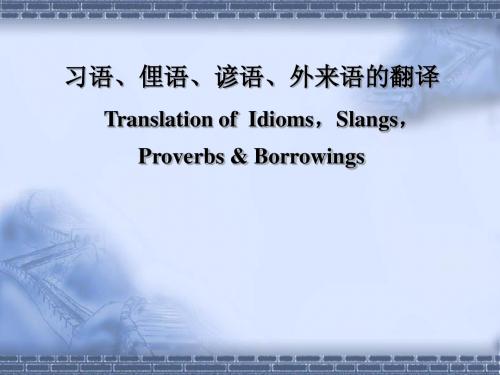
上来,也不能带什么离去。
26 返回章重点退出
课堂互动1: 翻译下列习语(参考译文)
1. Wealth is best known by want.
【译文】缺钱最知钱可贵。
2. They that do nothing learn to do ill.
【译文】人闲生事。/无所事事的人就会学干坏 事。
问题是你人太好,反被人欺,所谓“人 善被人欺,马善被人骑”,对于那些要求过 分的人要学会说“不”。
小节结束
19 返回章重点退出
习语翻译
补充练习
1) as poor as the church mouse
【译】赤贫如洗;穷无立锥之地
2) in the same boat with …
【译】与……境遇相同
直译法强调习语的民族、地域差异性、保持
原作的风格和异域文化特色、文化意象,对原习
语的表现形式和意义原则上不做任何调整。
4 返回章重点退出
a die-hard think tank time frame the hot line paper tiger armed to the teeth comfort woman to burn one’s boats to fan the flame(s) to turn a deaf ear to to have a well-oiled tongue a gentleman’s agreement
6 返回章重点退出
Mark made signs with his hands and moved his mouth soundlessly to show that walls have ears.
马克打着手势,又努努嘴,以示隔墙有耳。
习语的翻译

直译
• • • • • • • • • • 浑水摸鱼 to fish in troubled water 火上浇油 to add fuel to the flame 空中楼阁 castles in the air 沧海一粟 a drop in the ocean 倾国倾城 to overthrow cities and kingdoms
忌望文生义
• dog-eat-dog 1.This is an imperialist dog-eat-dog type of war. 2. Capitalism has carried over and greatly intensified this feudalistic dog-eat-dog element in social relationship. 3. In some early frontier towns it was dog-eat-dog.
终日不成章,泣涕零如雨。
She stops and drops the shuttle time and again, Shedding tears like pouring rain.
河汉清且浅,相去复几许。
Clear and shallow is the Milky Way, That keeps them miles and miles away.
意译
• 有口皆碑 • to win universal praise/ to be universally acclaimed • 各人自扫门前雪,休管他人瓦上霜 • Leave other’s business alone. • 忠言逆耳,良药苦口。 • Honest opinions go against your ears while the good medicine taste bitter.
习语翻译大全

A· A chain is no stronger than its weakest link. 一着不慎,满盘皆输.· All is not gold that glitters. 闪光的未必都是金子。
· A child is better unborn than untaught. 养不教,父之过。
· Art is long, life is short. 生命短暂,艺术长存。
· A friend is best found in adversity. 患难见真情。
· Although the sun shine, leave not your cloak at home. 未雨绸缪。
· A light heart live long. 心情开朗寿命长。
不恼不愁,活到白头。
· An apple a day keeps the doctor away. 日吃苹果一只,身体健康不求医。
· All covet, all lose. 样样垂涎,样样失落。
贪多嚼不烂。
· A good winter brings a good summer. 瑞雪兆丰年。
· All rivers run into the sea. 殊途同归。
· A small leak will sink a great ship. 千里之堤溃于蚁穴。
· All time is no time when it is past. 机不可失,时不再来。
· A baker's wife may bite of a bun, a brewer's wife may bite of a tun.近水楼台先得月。
· A short cut is often a wrong cut.欲速则不达。
习语的翻译
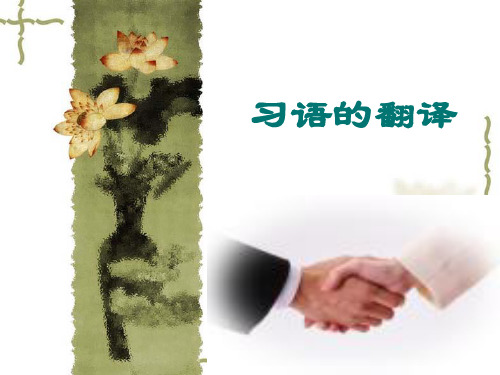
一、 什么是习语(idiom)
习语是经过长时间的使用而提炼出来的固定短语或短句,是人民智慧的 结晶。习语大都具有鲜明的形象,适宜于用来比喻事物,因而往往带有浓厚的 民族色彩和地方色彩。习语既是语言中的重要修辞手段,同时其本身也是各种 修辞手段的集中表现。因此,翻译时应当尽量保持这些特点。译者除了忠实地 表达原文习语的意义外,还应尽可能保持原文习语的形象比喻、丰富联想、修 辞效果以及其民族、地方特色等。
❖ 长时间的使用 ❖ 固定短语或短句 ❖ 鲜明的形象 ❖ 浓厚的民族色彩和地方色彩
❖ 俗语(Colloquialisms)
英语习语
(Idioms)
❖ 谚语(Sayings) ❖ 俚语(Slang expressions)
❖ The new naval(海军的) base has proved to be a white elephant;
她生长在富贵之家,认为凡事都可随心所欲。
三 小结
❖ 习语不仅是语言的精华,而且是语言的缩影,是语 言特征的集中反映:语言是人在劳动中创造的,大 部分习语就来自普通老百姓的生产活动和生活经历。 由于不同民族之间既存在相同的生产生活经历,也 存在不同的方面,因而,中英文习语中就存在意义 和形式完全相同的习语,也存在意义和形式不同的 习语。所以在翻译英语习语的时候,应该恰当地运 用直译,意译和套用汉语同义习语等方法,以保证 译文质量。
❖ (2)双方有大体相同的形象比喻:
英汉两种语言都有丰富的习语,其中 有许多是同义的或近义的,但由于它们是 在不同的社会地域环境中的两种不同的生 活经验的产物,有许多习语就会显著地表 现出两种不同的民族形式。例如:汉语中 常用“雨后春笋”来形容“事物的迅速发 展和大量产生”,英语中的同义习语是 “like mushrooms”。
10.习语、俚语、谚语、外来语的翻译
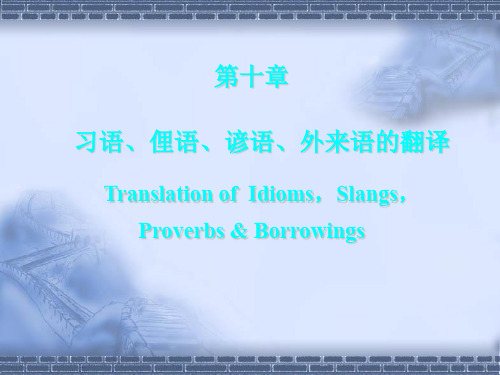
返回章重点退出
1. 就下列范围写谚语,每组至少要写出2-3条
4) education Teaching others teaches yourself. 教学相长。 A child’s back must be bent while it is young. 修树须趁早,育人要趁小。 Better unborn than unbred. 与其不管教,不如莫生育。 Like teacher, like pupil. 严师有高徒。 Think more, and you’ll become wiser. 多思出智慧。
15.S-hook
S形钩子
16.T-shirt
T恤衫
17.An American in 《华都舞影》(影片名)
Paris
18.The Arrival
《外星人入侵》(影片名)
19.At First Sight 《真情难舍》(影片名)
20.Attack Force Z 《Z字特攻队》(影片名)
小节结束
16 返回章重点退出
A. 加油站
B. 服务站
17.shake a wicked leg
A. 跳舞
B. 扭动了一下残废的腿
18.shut-eye
A. 瞎子
B. 睡觉
19.side-wheeler/ southpaw
A. 车辆侧轮
B. 左撇子
20.soft soap
A. 拍马屁
B. 香皂
正确答案:16A 17A 18B 19B 20A
1. 就下列范围写谚语,每组至少要写出2-3条
1)life
Moderation in all things.
生活要节制。/凡是都要适可而止。
六、习语的翻译
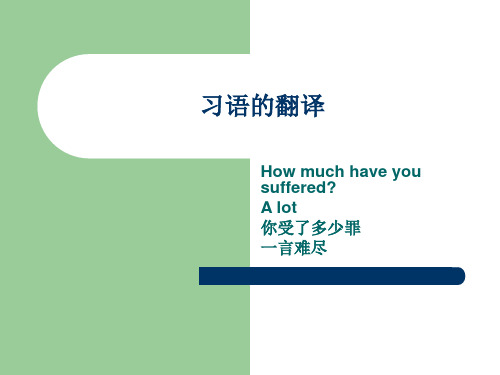
习语翻译练习
Every man has a fool in his sleeve . 聪明一世, 糊涂一时 Good wine needs no bush. 酒香不怕巷子深. Hold a candle to the sun. 多此一举 Set a beggar on the horseback and he will ride to the devil. 叫花子发财得意忘形。
意译法
Of poetry, I don’t read too much and when I do it I choose the dead lion in preference to the living dog. 诗歌我读的不多,即使是读,我也只读过去的 佳作, 不读当代的次品。
意译法
?人有悲欢离合?anolddogcanlearnnonewtricks?老顽固不能接受新事物?badworkmenoftenblametheirtools?不会撑船怪河弯直译意译?alittlepotissoonhot?壶小易热?量小易怒?不劳而获?reapwithoutsowing?profitbyotherstoil
照译原文,附加说明
The tongue is a fire 口舌如火,火能伤人,口舌亦然。 The tree is known by its fruits 观其果知其树,观其行知其人。 A rolling stone gather no moss. 滚石不生苔,常换工作不聚财。 There are more other fish in the fish. 海里的鱼多的是。(机会多的是。其他的人有的是。)
习语翻译练习
英语习语的翻译

(二)谚语翻译要注意语言的艺术性
一要注意用词的精练,二要注意上下两句的 对仗。不能用过于随便的口语句子来翻译。
• Men may meet but mountains never.
• 山和山无法碰头,人和人总会相遇。(不 要译成:人也许会相见,可是山头却不 会。)
• Who has never tasted bitter, knows not what is sweet.
• 人人都有糊涂的时候。(不宜直译“人人 袖子里都装着傻瓜。”)
• When Greek meets Greek, then comes the tug of war.
• 两雄相争,其斗必烈。
• It is an ill wind that blows nobody good.
• 对人人都有害的事儿,天下少有。(不宜 直译“不给任何人带来好处的风的确是恶 风。”)
• 在中国人眼里,最富有神奇色彩的数字莫过于“九” 了。汉语中带“九”的习语,有如“九霄云外”、 “九牛一毛”、“九死一生”、“九流宾客”、 “九牛二虎之力”、“九天九地”、“一言九 鼎”、“一龙生九子,九子各不同”等。中国人对 “九”的迷信源于对天的崇拜。英语中seven(七) 是一个被赋予神奇色彩的数字,具有特殊的文化内 涵。在《圣经》中,“七”是个神圣的数字。如 《创世纪》中说,上帝创造世界用了六天,第七天休 息,被定为“圣日”。《启示录》中说上帝“右手 拿着七星”、“七盏火灯在宝tues七大美德 seven deadly sins七宗罪。
Translation of English Idioms
英文习语翻译
英语习语的翻译方法大致可分为直译、直译 加注、套译、意译。
• 一、直译 • Forbidden fruit is sweet. • 禁果分外甜。 • All are not friends that speak us fair. • 说我们好话的不一定都是朋友。 • If you run after two hares, you will catch
习语的翻译
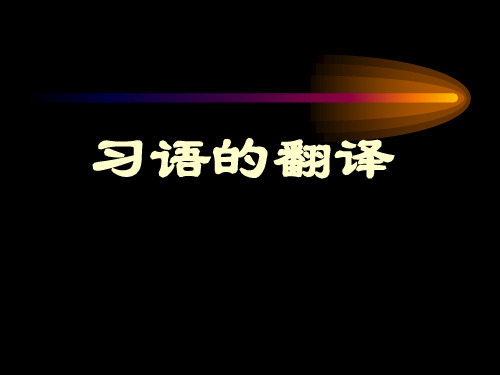
• • • • • • • • • •
to break the record 打破记录 under one’s nose 在某人的鼻子底下 armed to the teeth 武装到牙齿 packed like sardines 挤得象沙丁鱼罐头 sour grapes 酸葡萄 a die-hard 死硬派 a gentleman’s agreement 君子协定 an olive branch 橄榄树枝 the Trojan horse 特洛伊木马 the heel of Achilles 阿基里斯的脚跟
意译法
• 如果不可能或没有必要用直译法保留英 语习语的表达方式, 语习语的表达方式,并且在汉语中也找 不到合适的同义习语可供套用, 不到合适的同义习语可供套用,就得用 意译法配合上下文把英语习语的含义表 达出来。 达出来。
• ------The teenagers don’t invite Bob to their parties because he is a wet blanket. • 青少年们不邀请鲍伯参加他们的聚会 • 因为他是一个令人扫兴的人。 因为他是一个令人扫兴的人。 • ------Among so many well-dressed and cultured people, the country girl felt like a fish out of water. • 同那么多穿着体面而又有教养的人在一起, 同那么多穿着体面而又有教养的人在一起, • 这位乡下姑娘感到很不自在。 这位乡下姑娘感到很不自在。 • ------All right, I blame myself. But it’s the last time. We were cat’s paws, that’s all. • 得了,怪我自己瞎了眼。可是我再也不干了。 得了,怪我自己瞎了眼。可是我再也不干了。 我们上了人家的当,没别的。 我们上了人家的当,没别的。
习语的翻译

• • • • • • • • • •
To make a beast of oneself 形同禽兽 He that has been bitten by a serpent is afraid of a rope. 一朝被蛇咬,十年怕草绳。 Shallow streams make most din. 水深不响, 水响不深。 Money makes the mare go. 有钱能使鬼推磨。 Reckless youth makes rueful age. 少壮不努力,老大徒伤悲。
B. 习语形义基本相同, 这类习语比上 面一类在数量上要多些,例如:
• • • • • as light as a feather(or as thistle-down) 轻如鸿毛 to take a load off one’s mind 如释重负 to run in the same groove; to cut from the same cloth. • 如出一辙 •
D.英汉习语形异义似, 例如:
• • • • • • • A word spoken is past recalling. 一言既出,驷马难追。 Great boast, small roast. 干打雷, 不下雨。 Take not a musket to kill a butterfly. 杀鸡焉用宰牛刀。
• as lean as a rail • 骨瘦如柴 (如 直译为"瘦得像个横杆",则不符 合中国人习惯。) • clean hand • 两袖清风 • It was by no means a bed of rose. • 这决不是安乐窝。 • He cries wine and sells vinegar. • 挂羊头,卖狗肉。 • as pale (or white) as ashes • ( or sheet or death) 面如土色 •
- 1、下载文档前请自行甄别文档内容的完整性,平台不提供额外的编辑、内容补充、找答案等附加服务。
- 2、"仅部分预览"的文档,不可在线预览部分如存在完整性等问题,可反馈申请退款(可完整预览的文档不适用该条件!)。
- 3、如文档侵犯您的权益,请联系客服反馈,我们会尽快为您处理(人工客服工作时间:9:00-18:30)。
Unit Sixwarming-up 常识预习1. Idioms are an important reflection of the _____ of a language.2. What may idioms in broad sense include?3. Translate the English sentence into Chinese “All the good sense of the world runs into proverbs.”4. 谈谈习语的来源。
5. “习语的翻译不仅仅是两种语言的相互转换,更是两种文化的转化。
”你如何理解这句话?6. 如何最大限度地把原语习语中的文化色彩传达到译入语中去?lecturette专题讲座习语的翻译所谓习语,即约定俗成的固定词组或固定语句。
依照这一内涵宽泛的定义,习语可包括成语(idioms and phrases)、谚语(proverbs and allusions)、俗语(famous and popular)、警言(sparkling sentences), 以及汉语中特有的歇后语(enigmatic folk similes)等等。
英汉两种语言历史悠久,包含着大量的习语,它们或含蓄、幽默、或严肃、典雅,不仅言简意赅,而且形象生动,妙趣横和,给人一种美的享受。
一、英汉习语的文化差异习语在原语言中是增强表达能力的一种有力手段,往往蕴含着丰富的民族文化特色和文化信息,如果在翻译过程中能尽量把这一特色表现出来,会为文章增色不少。
因此,英汉习语互译首先要正确理解其含义,认识其文化特点,注意英汉习语之间的文化异同。
1.生存环境差异习语的产生与人们的劳动和生活的环境密切相关。
英国是一个岛国,历史上航海业曾一度领先世界,英语中有许多关于船和水的习语,如a ll at sea(不知所措), to sink or swim(无论成败), to rest on one’s oars(暂时歇一歇)。
而汉民族在亚洲大陆生活繁衍,人们的生活离不开土地,汉语中有相当一部分习语与土地、庄稼有关。
比喻花钱浪费,大手大脚,英语是spend money like water,而汉语是“挥金如土”。
2.生活习俗差异中西方生活习俗差异是多方面,最典型的莫过于在对这种动物的态度上。
在西方英语国家,狗被认为是人类最忠诚的朋友,英语中有关狗的习语大部分没有贬义,还常以狗的形象来比喻人的行为。
如a lucky dog(幸运儿),as sick as a dog(病得很厉害),Every dog has its day.(人人都有得意日)。
而汉语中狗是一种卑微的动物,与狗有关的习语大多含有贬义。
如狐朋狗友(evil friends),狗仗人势(to be a bully under the protection of a powerful person)。
3.宗教信仰差异与宗教信仰有关的习语大量出现在英汉语言中。
佛教传入中国有一千多年的历史,人相信“佛祖”左右着人世间的一切,因此有的习语就借用庙宇、和尚、佛作比喻。
如临时抱佛脚(to embrace Buddha’s feet in one’s hour of need),做一天和尚撞一天种(to take a passive attitude towards one’s work)。
在西方许多国家,人们信奉基督教、天主教,相关的习语如as poor as the church mouse(一贫如洗),God never shuts one door but he opens another.(天无绝人之路)。
4.历史典故英汉两种语言中还有大量由历史典故形成的习语,这些习语结构简单,意义深远,往往是不能单从字面意义去理解和翻译的。
中国人喜欢引用典故饰润语言,使之丰富多彩,生动形象。
汉语中的古代寓言故事、神话传说、文学著作中常有这样的习语。
如“夸父逐日”、“暗度陈仓”、“叶公好龙”。
西方文化有两大渊源,《圣经》和古希腊罗马神话,其中的许多故事已经演变成英语习语。
如Achilles’ heel(唯一致命的弱点), the sword of Damocles (处于非常危险地处境)。
二、习语的翻译方法翻译习语的标准首先是传达本义,其次是尽量保留文化特色和语言特色。
习语的翻译有四种主要方法:1.直译法;2. 直译解释法;3.等值借用法;4.意译法。
此外,在汉语中,人们习惯使用由四个字构成的成语,也喜欢使用成语之外的四字结构,这充分体现了汉语讲求平衡的特征。
因此,在后面的部分会专门讲解汉语四字格的翻译技巧。
1. 直译法( Literal interpretation)直译就是在不违背译文语言规范以及不引起错误的联想的条件下, 把习语原文的意思用译入语直截了当地表达出来,对原文的内容不加以增减,也不做任何解释,在译文中保留习语的比喻、形象和民族、地方色彩的方法。
英译汉to be on thin ice 如履薄冰a gentleman’s agreement 君子协定the most-favored-nation clause 最惠国条款to add fuel to the fire 火上浇油to go through fire and water 赴汤蹈火An ill tongue may do much. 恶语最伤人。
Beauty is but skin-deep. 美貌只是一层皮。
Blood is thicker than water. 血浓于水。
Care brings grey hair.忧多生白发Out of sight, out of mind. 眼不见,心不烦。
Heaven helps those who help themselves. 天助自助者。
Every man has his faults. 人非圣贤,孰能无过。
Plan the whole year in the spring. 一年之计在于春。
Better be a bird in the wood than one in the cage. 宁做林中鸟,不做笼中雀。
汉译英精打细算careful calculation and strict budgeting易如反掌to be as easy as turning over one’s hand竭泽而渔to drain a pond to catch all the fish打草惊蛇to stir up the grass and alert the snake人杰地灵a remarkable place producing outstanding people如虎添翼like a tiger who has grown wings三思而后行look before you leap巧孤掌难鸣You can’t clap with one hand.时势造英雄Circumstances create heroes.初生牛犊不怕虎New-born calves make little of tiger.跑得了和尚跑不了庙The monk may run away, but the temple can’t run with him.巧妇难为无米之炊Even a clever housewife cannot cook a meal without rice.路遥知马力,日久见人心A long road tests a horse's strength and a long task proves a man's heart.留得青山在,不愁没柴烧As long as green hills remain, there’ll never be a shortage of firewood.2. 直译解释法(Literal interpretation combined with paraphrasing)为了保留原文的文化色彩, 而直译又不能使读者理解时, 可在直译的基础上增加适当的解释性的词, 对原文涉及文化背景的内容加以解释或意译出来,使译文形象生动, 体现出原文的风格和韵味。
这种技巧适用于该习语原文的形象描述或引起的联想在译入语中难以找到对等的表达的情况。
英译汉Pandora’s box 潘多拉的盒子(比喻祸害的根源)soft soap 软肥皂(奉承,恭维,拍马)Solomon 所罗门(比喻聪明人或贤人)the Trojan horse 特洛伊木马(比喻引起内部破坏的因素)sour grapes 酸葡萄(得不到的东西就说它不好)stick and carrot 大棒和胡萝卜(软硬兼施)jam tomorrow 明天有果酱(许诺但不兑现的东西)to get blood from stone 石中取血(做不可能的事)storm in a teacup 茶杯里的风暴(小题大做)doubting Thomas 怀疑的托马斯(怀疑主义者)The darkest place is under the candlestick. 烛台之下最黑暗(上级不察下情)There is no rose without a thorn. 没有不带刺的玫瑰(世上没有十全的幸福;有乐必有苦)。
Sparrows should not dance with cranes.麻雀不应跟仙鹤一起跳舞。
(喻指人应有自知之明)He who laughs at crooked men should need walk very straight. 笑别人驼背的人得自己首先把身子挺直。
(己不正不正人)汉译英杞人忧天like the man of Chi who was haunted by the fear that the sky will fall--unnecessary anxiety盲人骑瞎马a blind man on a blind horse--rushing headlong to disaster生米煮成熟饭The rice is already cooked--Wha t is done cannot be undone.走马观花look at the flowers while passing them on horseback --glance over things hurriedly缘木求鱼climb a tree to catch fish--a fruitless approach借花献佛present Buddha with flowers given by another--make a gift of something given by another东施效颦Dongshi , an ugly woman , knitting her brows in imitation of the famous beauty Xishi-- only to make herself uglier.班门弄斧to show off one’s skill with the axe before Lu Ban -the master carpenter--to display one’s slight skill before an expert人非草木A man is not a stalk of grass or a tree--man is sentimental creature.杀鸡给猴看to kill the chicken to frighten the monkey--to punish somebody as a warning to others黄鼠狼给鸡拜年The weasel goes to pay his respects to the hen--not with the best of intentions.三个臭皮匠赛过诸葛亮Three cobblers with their wits combine surpass Zhuge Liang, the mastermind--two heads are better than one.水至清则无鱼Fish do not come when water is too clear--one should not demand absolute purity. 天涯处处有芳草There are fragrant flowers in every land--there are able men everywhere.3. 等值借用法(borrowing)两种语言中有些同义习语无论在内容、形式和色彩上都有相符合,它们不但有相同的意思或隐义,而且有相同的或极相似的形象或比喻。
